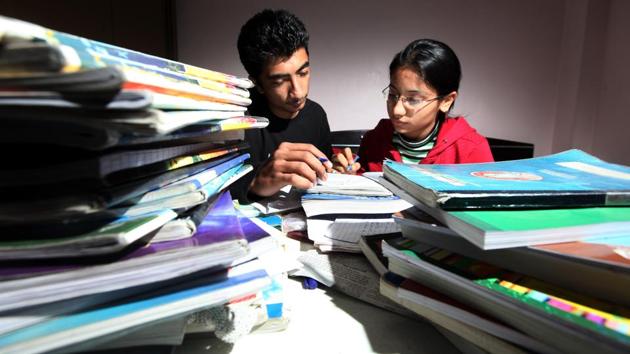
Childhood anxiety: Common causes, coping strategies for parents and children
7 months ago | 5 Views
Childhood anxiety can happen from various things and all of them are interconnected but differ from one child to another hence, parents need to understand its cause and techniques to cope with it. This mental health issue is becoming increasingly common, with stressors like academic pressures, social challenges and family dynamics playing key roles so, it is crucial for parents to help their children manage anxiety for their mental health and resilience.
Common Causes of Childhood Anxiety:
In an interview with HT Lifestyle, Archana Singhal, Counsellor, Family Therapist and Founder of Mindwell Counsel in Delhi, highlighted the following causes of childhood anxiety -
- Genetic factor: children with a family history of anxiety disorders are at great risk.
- Environmental factor: Environmental factors become a main contributor to anxiety. For:- Disturbance between both the Parents, fights in the family or the loss of a loved one can trigger anxiety. An unhappy family also contributes the feelings of anxiety.
- Social influence: Peer pressure, bullying and social interaction also contribute to anxiety. Pressure to be fit can lead to heightened anxiety.
- Academic pressure: In today's scenario, there is a lot of pressure to get good marks and grades. Tests and fear of failure also create anxiety among the children.

Bringing her expertise to the same, Prasanna Vasanadu, Parent Educator and Founder of Tikitoro, shared, “For children, understanding their triggers and learning to manage emotions is vital. In more severe cases, seeking professional help from a therapist may be necessary to address and manage anxiety effectively.” She listed the reasons for childhood anxiety as -
- Genetic factors: Anxiety or mental health issues run in the family.
- Environmental factors: Environmental factors include traumatic or stressful experiences, schedule adjustments, and family disputes.
- Personality traits: Children who are inherently more sensitive or perfectionistic are examples of personality traits.
- Developmental Factors: Typical developmental phases, such as the start of school or puberty, might set off anxiety.
- Habitual Behaviours: Children with anxiety may develop habits such as excessive scratching or picking at their skin, which can lead to irritation, infections, or scarring. These behaviors often stem from a need to cope with their anxiety.
- Academic Pressure: Stress from school can cause a lot of worry in kids, especially when they start attending more formal educational environments. Anxiety might be brought on by pressure to do well on tests, fear of failing, or concerns about grades and academic success.
Coping Strategies for Parents and Children:
Archana Singhal advised -
- Open Communication: Encourage your children to express their feelings, listen to them very carefully and try to understand them. After this conversation, they feel very light.
- Establish routines: Try to create and follow a healthy routine. Consistent daily routines help children to feel more in control and reduce anxiety levels.
- Teach relaxation techniques: introduce methods l like meditation, yoga and some physical exercise. These will help you manage and reduce anxiety.
- Seek professional help: If you see any significant impact of anxiety in your child's behavior. Then go and consult with a mental health professional.
- Limit exposure to stressors: Try to keep away the children from content that creates anxiety and help them manage their anxiety whether it is created by academic pressure or social interaction.
By understanding these root causes of anxiety and applying these coping strategies, parents can create a healthy and tension-free environment that promotes emotional well-being.

Prasanna Vasanadu said, “Parents can help by creating a supportive and open environment where children feel safe to express their emotions. Simply telling a child not to worry or to stop thinking about their problems is neither supportive nor validating. It’s better to reassure your child that it’s okay for them to be scared, and emphasize that you will be there to help them every step of the way. If a child has difficulty in explaining how they feel, ask them to communicate in the form of a story.”
She further recommended -
- Honest Communication: Encouraging your child to talk freely about their emotions can make them feel supported and understood.
- Actively Listen: Observe your child's spoken and nonverbal cues. Be understanding and affirm their emotions.
- Gradual exposure to Fears: Help children face their fears gradually by breaking them into manageable steps. For example, if a child is afraid of sleeping alone, start by sitting with them for a few minutes and gradually reducing time over a few nights.
- Establish a Daily Routine: Establish a regular schedule for your meals, homework, playtime and bedtime.
- Social networking: In healthy social relationships, anxiety can be lessened. Encourage your youngster to make friends and participate in enjoyable group activities. Sometimes, as children grow, social pressures related to appearance can lead to anxiety about their skin too.
- Promote Healthy Behaviors: Encouraging healthy practices can benefit your child's mental well-being. For example:
● A well-balanced diet should consist of a variety of fruits, vegetables, whole grains, and proteins for your child.
● Daily exercise to help lower stress and elevate mood.
● Create a relaxing evening ritual and make sure your kids get adequate rest.
● Fostering a positive outlook in your child can help them become less anxious and more resilient. It also increases their self-esteem and confidence.
Don’t wait for anxiety to escalate. Start implementing these strategies today to help your child build resilience and navigate their fears confidently. Talking about when to seek professional help, Prasanna Vasanadu suggested -
(i) When anxiety interferes in your child’s everyday activities, academic performance, or social interactions, professional assistance is necessary.
(ii) Your child may exhibit physical symptoms, including headaches or stomach aches, that are associated with anxiety.
Childhood anxiety is a common and manageable condition if you address it early and correctly. While it is natural for children to experience occasional fears, severe anxiety can harm a child's growth and development.
Read Also: How much exercise you really need each week: Are you following it?





















